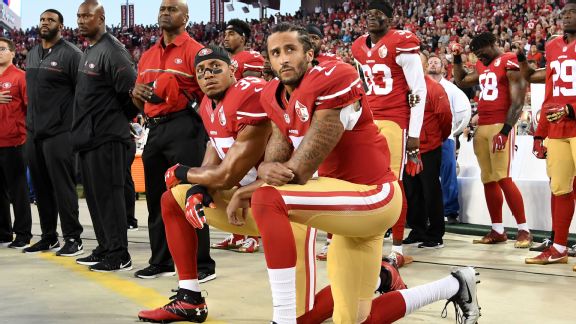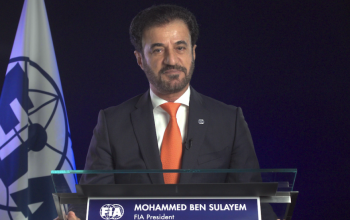Real problems are being pushed aside by NFL’s good intentions
Ben Denomme SPORTS EDITOR
Week three of the 2017–18 NFL season was an eventful one, and not just for the shocking losses and brilliant comebacks. In fact, the real shock for fans came before the games began, when several players knelt for the national anthem of the United States in protest of recent divisive comments made by President Donald Trump.
Kneeling as a form of protest began with Colin Kaepernick during the 2016–17 NFL preseason when many fans noticed him kneeling for the United States’ national anthem rather than standing, standing being deemed the patriotic and respectful gesture. In fact, WNBA players were kneeling for the anthem before Kaepernick, but this did not get nearly the same attention that was paid to male athletes.
Kaepernick’s protest was a way of calling to attention the many unjustified deaths that unarmed African- American men suffered at the hands of police. These deaths were usually unreported or not given the attention Kaepernick felt they deserved, and so he took matters into his own hands. The protest extended to include awareness for the underrepresentation of all non-white citizens and the poverty and debilitating conditions that many of them have to deal with because of their race.
His protest resulted in national outrage and controversy as well as, some would argue, his release from the San Francisco 49ers during the 2016–17 season. To date, Kaepernick is still a free agent, much to the displeasure of some other NFL athletes and commentators.
The protest, as shocking as it was at the time, was pushed aside for several months while the nation dealt with other seemingly more pressing issues, such as the American national election.
It was only at the beginning of the current NFL season that the protest recurred. Football players from many teams slowly started to join in Kaepernick’s protest, but, after a series of tweets from Trump on September 23, 2017, the NFL, its various teams, and Commissioner Roger Goodell generally agreed that kneeling in protest was their right as players.
Soon, athletes from different professional and non- professional leagues began to exercise their right to protest as well. Notably, LeBron James of the NBA was vocal on Twitter about his displeasure with Trump, tweeting, “Going to White House was a great honor until you showed up!”
Of course, the question now becomes: Is the subject of this recent protest what Kaepernick had in mind when he began kneeling last year? Is the original issue being washed out? And if so, is what has taken its place as valuable?
The answer to these questions lies in Goodell’s statement on the comments made by Trump. He wrote, “The NFL and our players are at our best when we help create a sense of unity in our country and our culture.”
Unity is the key word in his statement, and the display of unity from NFL players before their games was certainly identifiable. However, this display of unity may distract fans and observers from the issue Kaepernick set out to make known. It is valuable to support unity, but if the support is not widely accepted and established, the people it was intended to benefit will fall through the cracks.
Furthermore, the mere fact that the catalyst for protest was the president’s direct comments on the patriotism (or lack thereof) of athletes is cause for concern. Trump, and the athletes who knelt only after Trump’s tweets, have taken attention away from the issue of the underrepresentation and unjustified murders of non-white citizens and focused it on the issue of how to properly respect the national anthem.
Kaepernick began his protests with a specific goal in mind — to raise awareness for issues which the public would otherwise ignore. If significant progress is to be made toward achieving his laudable goal, less emphasis should be placed on who is protesting, and more should be placed on what is being protested.




